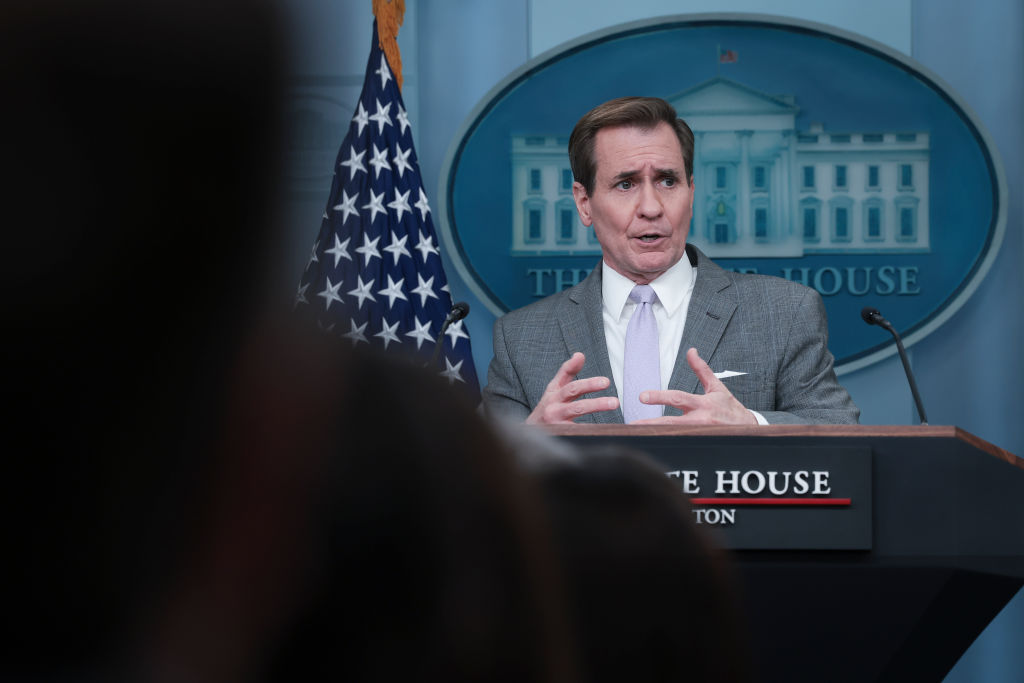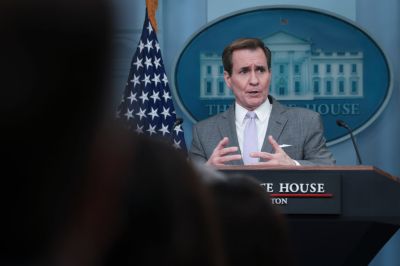Happy Tuesday! Five zebras, four camels, and a miniature horse were rescued from a burning circus truck in Indiana on Sunday. All of the animals and the vehicle’s driver were uninjured, and, as far as we can tell, this was not a preview of a new death-defying act.
Quick Hits: Today’s Top Stories
- The United States and United Kingdom on Monday announced sanctions targeting a network of individuals, led by Iranian narcotics trafficker Naji Ibrahim Sharifi-Zindashti, that plotted to assassinate Iranian dissidents at the direction of Iran’s Ministry of Intelligence and Security. The sanctions followed indictments that charged Zindashti with hiring two Canadian hitmen to kill two Iranian refugees living in Maryland, though the plot was never successfully carried out. “The Iranian regime’s continued efforts to target dissidents and activists demonstrate the regime’s deep insecurity and attempt to expand Iran’s domestic repression internationally,” Under Secretary of the Treasury for Terrorism and Financial Intelligence Brian E. Nelson said in a statement released yesterday. The Treasury Department identified multiple assassination plots allegedly led by Zindashti, including the 2017 murder of Saeed Karimian, a British national and owner of Gem TV, which aired content that was critical of the Iranian government.
- Former Finnish Prime Minister Alexander Stubb was projected to narrowly win the first round of the country’s presidential elections on Sunday, setting him up for a runoff election against Pekka Haavisto, a former foreign minister, on February 11. Both Stubb and Haavisto have promised to take a hard line against Russia in the first election since Finland became a NATO member in 2023.
- The U.S. on Monday began to reinstate sanctions on Venezuela in response to President Nicholas Maduro’s continued ban on leading opposition candidate Maria Corina Machado from running for president. The sanctions announced last night require U.S. companies to end transactions with Minerven, a Venezuelan state-owned gold mining company, by February 13, and the Biden administration has suggested that it would allow a Treasury deal permitting trade with Venezuelan oil companies to expire in April unless Machado is allowed to run.
- U.S. military officials told the Wall Street Journal on Monday that confusion over a returning U.S. drone caused the failure to stop Sunday’s attack on a military outpost in Jordan that killed three U.S. service members and injured at least 40 more. The enemy drone, which was launched from Iraq by Iranian-backed militants, was reportedly mistaken for the friendly surveillance drone as it approached the base at the same time the U.S. craft was also returning to base. The Department of Defense identified the three fallen soldiers on Monday: Sgt. William Jerome Rivers of Willingboro, New Jersey; Spc. Kennedy Ladon Sanders of Waycross, Georgia; and Spc. Breonna Alexsondria Moffett of Savannah, Georgia.
- The U.S. Department of Energy (DOE) finalized new energy efficiency standards for household cooking products on Monday that, among other inclusions, allow gas stoves to keep high-powered burners. The new rules impact appliances built in 2028 or after, and DOE estimated that “approximately 97 percent of gas stove models and 77 percent of smooth electric stove models on the market already meet” the new standards.
A Matter of Time

In the wake of the October 17 explosion at the Al-Ahli Arab Hospital in Gaza—and widespread misreporting on what occurred—U.S. troops stationed in Iraq and Syria began facing near-daily drone, rocket, mortar, and missile attacks launched by various Iranian-backed militia groups.
On October 25, for example, American forces stationed at Al-Asad Air Base in Western Iraq were targeted in a drone attack—one drone, laden with explosives, struck a barracks but didn’t explode. Had it detonated, Americans likely would have been killed. On Christmas Day, an attack on Erbil Air Base injured three service members, with one soldier suffering a “devastating neurological injury” and needing to be put in a medically-induced coma after shrapnel from a drone struck his head. Four U.S. troops suffered traumatic brain injuries on January 20 after a ballistic missile strike on Al-Asad Air Base.
There have been 165 such attacks since October—and at that rate, it was a matter of when, not if, U.S. forces would suffer fatalities. It happened over the weekend, when three ...
As a non-paying reader, you are receiving a truncated version of The Morning Dispatch. Our full 1,548-word story on the latest Iranian-backed strike on U.S. forces is available in the members-only version of TMD.
Worth Your Time
- In the 1940s, beavers—then considered a nuisance—were parachuted out of planes into remote locations to evict them from ranch communities. Today, humans are still rehoming beavers, albeit in much different ways and for much different reasons. Writing for Atlas Obscura, Danielle Hallock chronicles the long and fascinating history of beaver relocation, revealing that the animal’s ecological impacts can even be seen from space. “NASA’s network of satellites take images of the surface regularly, and in some places their photographic records go back decades,” she wrote. “NASA analysts can see the impact of all those beavers that were parachuted around Idaho in the 1940s. Shortly after that operation, something remarkable happened to those remote locations. Baugh Creek, which received many animal packages from the sky, became so lush and verdant that the greenery clearly stood out from space. A 2018 wildfire torched the surrounding land, but Baugh Creek’s beaver-rich ‘emerald refuge’ resisted the blaze.”
Presented Without Comment
National Security Adviser Jake Sullivan, September 29, 2023: “The Middle East region is quieter today than it has been in two decades.”
Secretary of State Antony Blinken, January 29, 2024: “This is an incredibly volatile time in the Middle East. I would argue that we’ve not seen a situation as dangerous as the one we’re facing now across the region since at least 1973, and arguably even before that.”
Also Presented Without Comment
Independent presidential candidate Robert F. Kennedy Jr. told NewsNation that former President Donald Trump’s team reached out to ask about serving as Trump’s VP.
“I would not take that job,” Kennedy said. “And I’m flattered that President Trump would offer it to me, but it’s not something that I’m interested in.”
Toeing the Company Line
- In the newsletters: Kevin explained the problem (🔒) with “monetizing the debt,” the Dispatch Politics crew checked in on the No Labels super PAC, and Nick compared (🔒) former Gov. Nikki Haley’s Trump truth telling to that of former Republican Rep. Liz Cheney.
- On the podcasts: Sarah and David dive deep into the state of immigration law on the latest Advisory Opinions, weighing in on Texas Gov. Greg Abbott’s legal battle with the Biden administration.
- On the site today: Patrick T. Brown offers a defense of lawmakers’ new child tax credit proposal, and Chris Stirewalt writes on the history of natural gas politics.








Please note that we at The Dispatch hold ourselves, our work, and our commenters to a higher standard than other places on the internet. We welcome comments that foster genuine debate or discussion—including comments critical of us or our work—but responses that include ad hominem attacks on fellow Dispatch members or are intended to stoke fear and anger may be moderated.
With your membership, you only have the ability to comment on The Morning Dispatch articles. Consider upgrading to join the conversation everywhere.